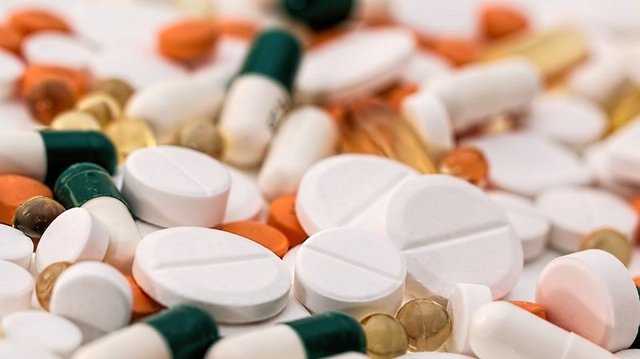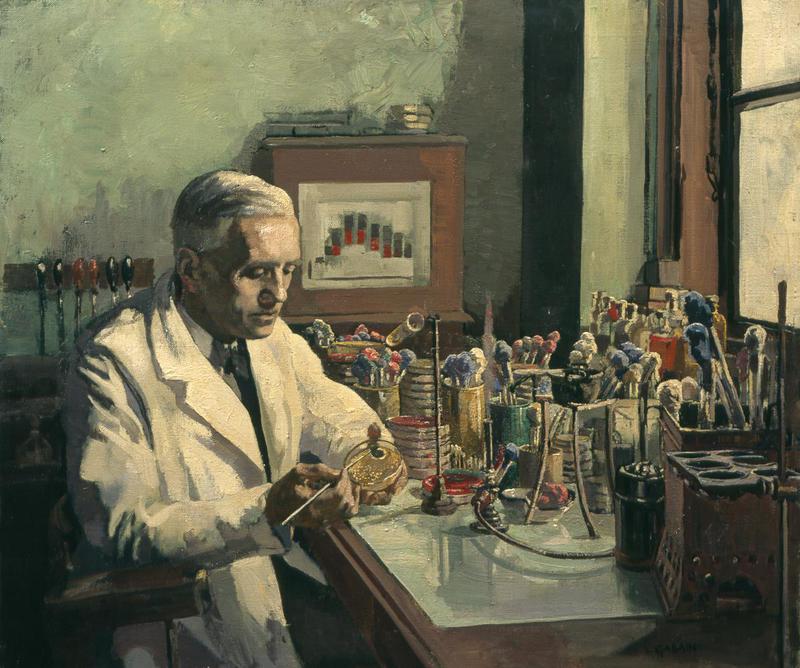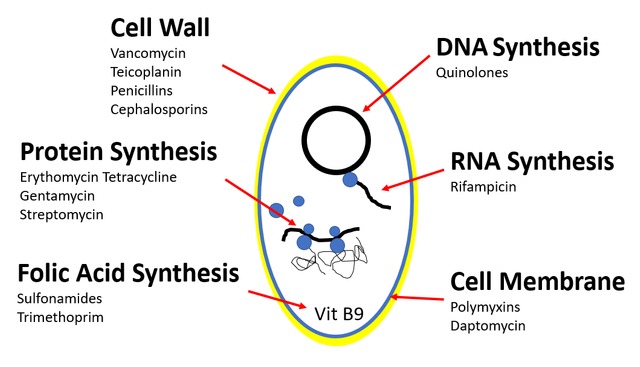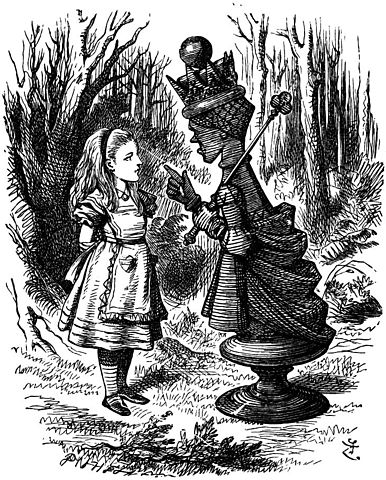Antibiotics – discovery, function, problems...
Hi guys! Today I want to talk about antibiotics – quite popular topic nowadays don’t you think? Well, I want to at first define the term antibiotics, then give you a bit of historical background and continue with mechanism of action of antibiotics. I would also like to talk a bit about super bugs and why they represent a serious problem.

What are antibiotics?
The term antibiotics could be defined as small metabolites of microorganisms with molecular mass bellow 2000, which even at low concentrations inhibit growth of other microorganisms, but not the producer. So, they are basically a defense system or a chemical weapon of the host organisms against other lifeforms (such as bacteria). Even the term antibiotic means opposing life.
Discovery of penicillin – accidents happen

As happened many times throughout the history, sometimes we make great discoveries by accident. You probably all heard about penicillin – the “first” antibioticum. The discovery of penicillin marks the beginning of era of modern antibiotics. It all happened in September 1928 (note that this discovery is not even 100 years old!). Scientist known as Alexander Fleming just returned to his laboratory from holiday. As Fleming worked with bacteria (known as staphylococci) he stacked all his Petri dishes with cultures of bacteria and put them on a bench in his lab before leaving. When he returned from his vacation he found a contamination on one of the plates. Upon closer examination Fleming noticed, that the area around fungal contamination(mould) was free of any bacteria, however further away from the contamination the bacteria grew normally. He decided to cultivate the mould and found out that it produced something capable of killing bacteria. He then identified the mould (it was Penicillium notatum) and named the bacteria-killing substance mould juice. Not very good name. Fleming thought so as well and after few months named the substance penicillin. Take-home message from this? It is okay to sometimes have a contamination – you might save the world! I like a quote made by Mr. Fleming about his discovery:
When I woke up just after dawn on September 28, 1928, I certainly didn't plan to revolutionise all medicine by discovering the world's first antibiotic, or bacteria killer. But I suppose that was exactly what I did.
Quite badass quote, don’t you think?
Well, since this discovery there were numerous advances in research of antibiotics. I would like to mention the name Joshua Lederberg that discovered the molecular mechanism of action of antibiotics. Which brings us to other question…
How do antibiotics actually work?
Well, they inhibit many essential cellular structures and functions. They usually use on of the four following mechanisms:
- Inhibition of enzymes involved in protein synthesis
- Inhibition of enzymes involved in cell wall biosynthesis
- Inhibition of enzymes involved in nucleic acid metabolism and repair
- Disruption of membrane structure
Many times, are antibiotics most active in dividing cells. And because there are some mechanisms that are very similar between bacteria and eukaryotic cells, some antibiotics might be used for example as drugs against cancer.
Picture bellow represents some of the targets of antibiotics in cells as well as names of some antibiotics with these mechanisms of action.

Hypothesis of the Red Queen
Now, here, you see, it takes all the running you can do, to keep in the same place.
This is a statement from Lewis Carroll’s book Through the Looking-Glass made by no other than the Red Queen herself. And this quote is a great metaphor for evolutionary arms race proposed for the first time by Leigh Van Valen in 1973. What is this about? Well, it basically says that in order to survive species have to “run” (evolve) in order to stay in the same place, or else they become extinct. What does it have to do with antibiotics you ask? Well there is an ongoing arms race between humans and bacteria. We use antibiotics to get rid of them, right? But they want to survive! Thus they evolve and become immune to antibiotics…whoops.

Source
Houston, we have a problem!
Yes, antibiotics did revolutionize medicine and saved countless of lives. However, they also gave rise to so called super bugs – bacteria resistant to antibiotics. Usually the resistance occurs after 3-4 years after first use of specific antibiotic. What we do then? Use another one, and we go on and on. Good strategy? Not really. Yes, we are trying to produce new and new antibiotics, but can we keep pace?
Fortunately, the use of antibiotics is more controlled and responsible nowadays than in the past. Back then antibiotics were used even when there was no indication or necessity to use them. Such misuse and spread of antibiotics created a huge evolutionary pressure on bacteria, thus accelerating their own evolution. This is a serious threat to all humans. And this should also be an appeal to you do not use antibiotics when unnecessary. Go to your doctor, find the root of your illness and do not home-remedy yourself with some left-over antibiotics.
Concluding remarks
Here I want to appeal to future scientists and doctors. There is going to be much greater need for antibiotics than ever – and there are probably plenty of them in nature – undiscovered and waiting for you to find them. Be it in soil or oceans. And dear doctors – proper diagnosis is the best first step. Do not just prescribe wide-spectrum antibiotics to kill anything and everything. Use them with caution. My old doctor did use them like this – every time I got there with sore throat I got antibiotics..
Hopefully you did all learn something new today! Please support me with upvote, comment or one new antibiotic discovery.
Have a great day!
References:
Antibiotics – Wikipedia article
Alexander Fleming – Wikipedia article
Red Queen hypothesis – Wikipedia article
Mechanism of Action of Antibiotics – Sigma-Aldrich Website
This is a test comment, notify @kryzsec on discord if there are any errors please.
Being A SteemStem Member
Thanks for writing on another topic very close to my heart. Great article. I think making doctors aware of the correct use of antibiotics can only go so far as reducing misuse cases a bit. What needed, and so far non-existence, is a point-of-care diagnostic test (think pregnancy test) that can tell the doctor on the spot what antibiotic is safe to use for a particular infection. Or, even in a simplest cases, confirm to the doctor that it is indeed a bacterial, not viral, infection and therefore the use of antibiotic is needed.
I am happy that you liked the article @pmduy!
Yes, such technology would be amazing! However, I have no idea how to create it, but will keep thinking. Great inspiration for future article btw :D hypothetical technology that could diagnose it in short time.
It's not hypothetical, several markers in blood have been associated with either bacterial or viral infections, one of them is human neutrophil lipocalin (HNL). I think the test based on HNL is coming: see here
Wow! Thanks for the link, going to check it in the morning (night here), didnt know that we have such tech already.
Very interresting post, recommended to not use antibotiques only in urgent situation, because using it alot make your hummunity low
Superbugs are scary! Specially in countries like India. Researchers are starting to look for new kinds of strategies to combat against superbugs. Like anti microbial peptides. But the research is still in infancy I guess.
But there is one nice thing about humans - we always managed to somehow find a solution. So we should stay optimistic.. :D
Yesterday, I was watching House MD and your concluding remark and his statement match somewhat. Not that I am blaming someone, but doctors have made it worse up to some extent. But anyways nice article.
I am glad you liked it! :)
Well, yes, the doctors sometimes did and do misuse antibiotics. But I believe that new generation of doctors already is aware about the raise of superbugs and use antibiotics more cautiously.